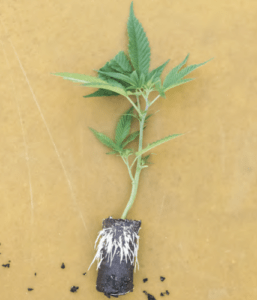How Dutch Heritage Gardens Expanded into the Hemp Market
Back in 2014, Aaron Van Wingerden of Dutch Heritage Gardens decided to take the plunge into the marijuana market. He applied for a license and created a new company with two brothers in Colorado Springs that owned a couple of dispensaries. They built a 2-acre greenhouse in Pueblo to grow marijuana.
After a few years, Aaron wasn’t content with the industry and decided to sell out of the business. However, he did not leave the industry completely. He saw opportunity in another segment of the market — hemp.
“I had already gone through the challenges that go with cultivating a cannabis cutting into a rooted liner,” he says. “It’s definitely not like a petunia or a geranium, and we’ve killed a lot of plants to figure out how to propagate properly.”
After selling the marijuana company, Aaron got into hemp initially to breed genetics. He says most of the genetics in hemp were derived from marijuana culture and that breeding was done indoors. “Hemp genetics couldn’t handle the wind or the rain or the fluctuation in temperatures,” says Aaron. “We saw very early on the need to breed better genetics.”

In 2017, they built an R&D field outside the Dutch Heritage property to trial genetics and were able to then offer farmers rooted clones of top hemp genetics Aaron says they grew about 100,000 plants that first year and by 2019 they grew 3 to 4 million plants.
Aaron speculated for 5 million clone sales in 2020, but unfortunately, the pandemic hit. With oversupply and not enough extractors, they only sold 1 million of the 5 million grown.
“Hemp has been a bit of a roller coaster because it is such a young, immature industry. We had school teachers that quit their jobs and were going to become millionaires growing hemp!” says Aaron. “Growing it in the field is one thing, but then you had to cut it down, dry it, harvest it, cure it. It’s a very processed plant. It takes effort at the back end — I don’t think most people understood that in the beginning.”
Aaron is a big believer that the hemp market is here to stay. “You just have to ride the peaks and valleys,” he says. “And the science and research are still catching up. We’ve only scratched the surface on what all these cannabinoids can do. Right now, CBD tinctures are one size fits all. I think in the future, the market will have specific formulations. For example, OK, you’ve got a headache, here’s a formula that is 10% CBD and 11% CBC and 2% CBN and so on.”
And that is where Dümmen Orange comes into play. Keith Cable, Dümmen Orange president, visited the facility a couple years ago. Aaron showed him the hemp motherstock they were growing to create cuttings and proposed they work together to push high-quality material out to the market. “Dümmen already has sales employees on the ground that see growers and farmers. So we could be the rooting station, and Dümmen could apply their genetics technology to the hemp market.”
Aaron says they’re currently training employees about hemp clones and how the market is different than marijuana. But he sees the partnership coming into fruition in the next three to five years.
Jasmina Dolce is managing editor of GPN magazine. She can be reached at jdolce@greatamericanpublish.com.



